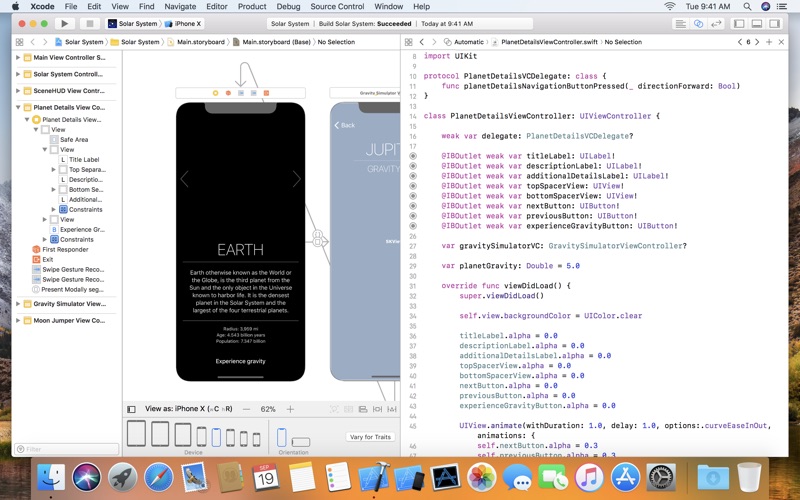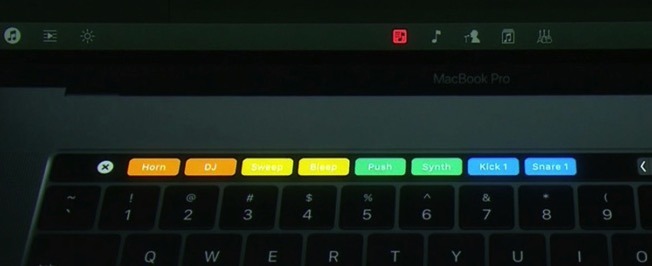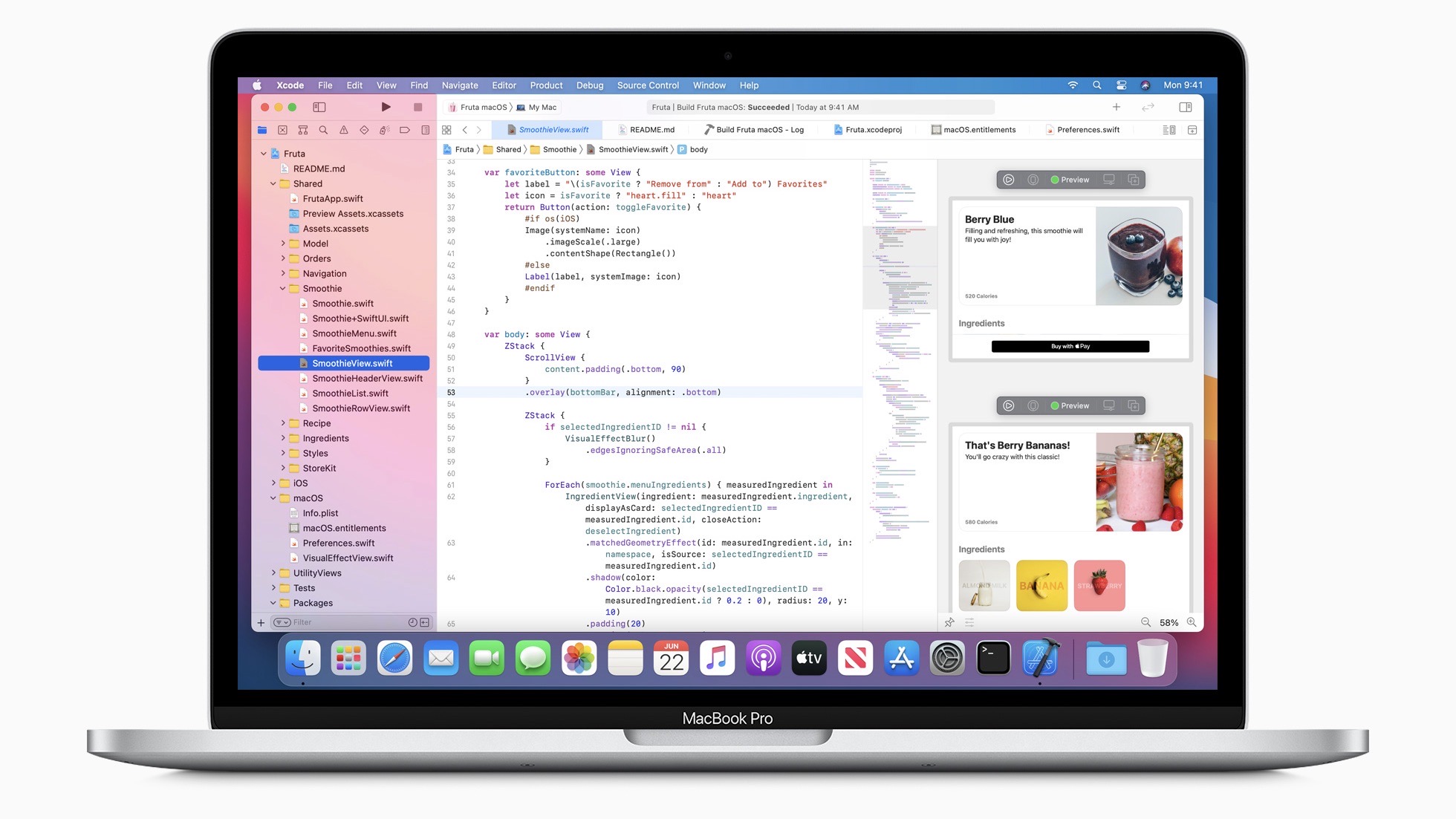Apple Xcode For Mac
Apple ® developers can use MacinCloud to develop and publish feature-rich applications with tools like Xcode, iOS Simulator, and more CHOOSE A PLAN MacinCloud supports the latest and legacy versions of Xcode, suitable for different levels of developers. Xcode includes everything developers need to create great applications for Mac, iPhone, iPad, Apple TV, and Apple Watch. Xcode provides developers a unified workflow for user interface design, coding, testing, and debugging. The Xcode IDE combined with the Swift programming language make developing apps easy and fun. New in this version.
Apple Xcode 9.4 for Mac Overview A professional integrated development environment, Apple Xcode 9.4 provides a wide range of powerful tools that and a reliable development environment. A straightforward user interface provides a more comfortable environment to the developers.
Xcode is Apple's IDE, made for producing software on Mac for use on iOS, iPadOS, macOS, tvOS, and watchOS. Free to download and use, the IDE is chiefly used by developers to create iPhone and iPad apps, as well as programs for the Mac.
● IDE for macOS
● Used for macOS, iOS, iPadOS, watchOS, tvOS development
● Free to download and use
● Code editor offers suggestions and corrections
● Support for Swift and other languages
● Interface design tools
A long-standing tool for app production, Xcode is a well-known integrated development environment (IDE), enabling developers to write the code and compile apps that can be used on various devices and operating systems. As Apple's own IDE, it is primarily used for the development of apps within its own ecosystem, though it can be used for writing source code in a variety of languages for use in other projects.
Xcode Apple Mach-o Linker (ld) Error Group
As an entire suite, developers can use Xcode to design the user interface, write app code, compile code, test the code and app, and debug. On completing an app to a quality where it can be accepted for distribution, Xcode can submit the app to Apple's assorted App Store marketplaces.
Apple provides Xcode free to all macOS users, though in order to distribute apps via the different App Store versions, it requires an Apple Developer Program subscription, costing $99 per year.
Xcode is based on Project Builder, an IDE originally created by NeXT for the NeXTSTEP OS. Launched in 2003 for Mac OS X 10.3 Panther, Apple gave Xcode a new user interface to make it more useful for Mac software development.
Since its introduction, Apple gave Xcode a steady stream of updates over the years, adding support for newer operating systems and new features. Updates also saw the dropping of compatibility for legacy systems, such as PowerPC in Xcode 4.0, forcing developers to produce apps for Intel-based Macs.
Xcode is currently on version 11.3, and is available to download from the Mac App Store.
The core of the Xcode suite is the IDE, which itself is also called Xcode. The application serves as the main interface for all other elements of the Xcode suite, displaying files that are being worked on and windows for other tools.
Similar to other development environments, developers type code into a file shown in a main window. As users type code, the IDE provides assistance in various ways, helping ensure users can produce clean and understandable code and minimize errors.
These can include color-coding the source code to reflect different elements of the coding language's structure. Depending on the selected development language, the IDE can even offer suggestions of what the developer may want to enter into a location, such as variable names.
The same system can also flag issues with how an element is coded, such as if expected symbols are missing or function names were typed incorrectly. In flagging errors, it also includes suggestions to fix the problem.
An example of how an app can appear in Xcode as it gets developed
Developers can keep multiple files open in tabs to switch between at will, with the interface updating depending on the kind of file being accessed or the task at hand. It is also possible to switch between files in a side-directory view, which shows all the files and folders used for a development project.

Xcode supports writing programs in Swift, AppleScript, C, C++, Objective-C, Objective-C++, Python, and Ruby, with third-party support also available for a number of other languages.
To assist with learning Xcode's features and app development, users can set up a so-called Playground to experiment with code. In this case, it offers various pre-made projects to educate the user and provide education, rather than teaching how to code as with the iPad's Swift Playgrounds.
Apple strongly promotes Swift as its language of choice across all of its platforms, and as of Xcode 11, hints at the use of SwiftUI for development.
A key element of this is that SwiftUI apps are native on all Apple-owned platforms. Users can easily transplant core logic of a SwiftUI iPhone app to a macOS app and vice versa, with Xcode accounting for platform-specific elements in each version.
Apple Xcode Download
This is most apparent in one feature where Xcode can convert an iPad app into a native Mac app by ticking a single checkbox, leading to an app that can use keyboard and mouse rather than a touchscreen. The intent is to simplify the porting process of iPad apps for macOS, though developers have found the option does still require further refinement of the interface for iPad apps to be truly useful on the Mac.
As part of this, it automatically applies support for elements such as Dark Mode, localization, accessibility features, and dynamic type.
SwiftUI uses a declarative syntax, where the developer states what the user interface should do, such as listing items in a text field then defining the formatting of each field. This also extends to animations and other areas, with SwiftUI handling most of the work to get the code running for many different built-in effects.
Further in terms of design, useres can apply drag-and-drop elements in the design canvas and affect the code, while code changes also apply to the live preview. Xcode recompiles the changes as part of the app automatically in these instances, so the app is always editable while running.
The program also includes Interface Builder, a system that assists with creating an app user interface. The tool lays out parts of the in-development app, as well as designing menus, buttons, windows, and other elements.
Xcode includes an extensive built-in library of objects and assets for developers, and it supports assets developed elsewhere.
To assist with producing apps for various screen sizes and orientations, an Auto Layout system can automatically line up interface elements. This lets developers create responsive apps that appear visually similar across the Apple ecosystem, regardless of device orientation.
Interface Builder can also prototype the interface quickly, connecting it to just-written source code in a preview panel. Users can employ the Storyboard for creating designs of individual screens, as well as visualizing how users navigate through the app's different screens.
A storyboard's UI controls can connect to code that regulates their behavior using the Assistant tool. In cases where the developer hasn't written any code for an element, the Assistant can create a stub for an action, for the developer to fill out later.
Xcode stores projects in Git repositories, a common way of containing an app during development. As well as accessing remote and public Git repositories, Xcode is capable of creating local Git repositories for new projects.
In cases where multiple people are working on a project, version control keeps track of development changes. In Xcode's Version editor, it can keep track of when changes were made and submitted to the repository, as well as who made the change.
Xcode is a complete developer toolset for creating apps for Mac, iPhone, iPad, Apple Watch, and Apple TV. Xcode brings user interface design, coding, testing, debugging, and submitting to the App Store all into a unified workflow.
Downloading and updating Xcode
The current release of Xcode is available as a free download from the Mac App Store. The Mac App Store will notify you when an update is available or you can have macOS update automatically as it becomes available.

The latest beta version and previous versions of Xcode can be downloaded from the Downloads page. To download Xcode, simply sign in with your Apple ID.Apple Developer Program membership is not required.
Using Xcode
Get step-by-step guidance on how to use Xcode to build, test, and submit apps to the App Store.
Submitting apps to the App Store using Xcode
If you’re an Apple Developer Program member, Xcode provides an integrated workflow to prepare and submit apps to App Store. You should use the latest version of Xcode available on the Mac App Store to submit your apps, or when available, the latest GM seed release from the Downloads page.
Do not submit apps built using beta software, as beta versions of Xcode, Operating Systems, and SDKs are for development and testing only.
Learning about changes to Xcode
To learn about the latest features and capabilities in Xcode, see What’s New in Xcode. For update details in the latest released versions, including each beta release, see the Xcode Release Notes.

Minimum requirements and supported SDKs
| Xcode Version | Minimum OS Required | SDK | Architecture | OS | Simulator | Swift |
|---|---|---|---|---|---|---|
| Xcode 12.3 beta | macOS Catalina 10.15.4 (Intel-based Mac) macOS Big Sur 11.0 (Apple silicon Mac) | iOS 14.3 macOS 11.1 tvOS 14.3 watchOS 7.3 DriverKit 20.0 | x86_64 armv7 armv7s arm64 arm64e | iOS 9.0-14.3 iPadOS 13.0-14.3 macOS 10.9-11.0 tvOS 9.0-14.3 watchOS 2.0-7.2 | iOS 10.3.1-14.3 tvOS 10.2-14.3 watchOS 3.2-7.2 | Swift 4 Swift 4.2 Swift 5.3 |
| Xcode 12.2 | macOS Catalina 10.15.4 (Intel-based Mac) macOS Big Sur 11.0 (Apple silicon Mac) | iOS 14.2 macOS 11 tvOS 14.2 watchOS 7.1 DriverKit 20.0 | x86_64 armv7 armv7s arm64 arm64e | iOS 9.0-14.2 iPadOS 13.0-14.2 macOS 10.9-11.0 tvOS 9.0-14.2 watchOS 2.0-7.1 | iOS 10.3.1-14.2 tvOS 10.2-14.2 watchOS 3.2-7.1 | Swift 4 Swift 4.2 Swift 5.3 |
| Xcode 12.1 | macOS Catalina 10.15.4 (Intel-based Mac) macOS Big Sur 11.0 (Apple silicon Mac) | iOS 14.1 macOS 10.15.6 tvOS 14.0 watchOS 7.0 DriverKit 20.0 | x86_64 armv7 armv7s arm64 arm64e | iOS 9.0-14.1 iPadOS 13.0-14.1 macOS 10.9-11.0 tvOS 9.0-14.0 watchOS 2.0-7.0 | iOS 10.3.1-14.1 tvOS 10.2-14.0 watchOS 2.0-7.0 | Swift 4 Swift 4.2 Swift 5.3 |
| Xcode 12 | macOS Catalina 10.15.4 (Intel-based Mac) | iOS 14 macOS 10.15.6 tvOS 14 watchOS 7.0 DriverKit 20.0 | x86_64 armv7 armv7s arm64 arm64e | iOS 9.0-14.0 iPadOS 13.0-14.0 macOS 10.6-10.15.6 tvOS 9.0-14.0 watchOS 2.0-7.0 | iOS 10.3.1-14.0 tvOS 10.2-14.0 watchOS 3.2-7.0 | Swift 4 Swift 4.2 Swift 5.3 |
| Xcode 11.7 | macOS Catalina 10.15.2 | iOS 13.7 macOS 10.15.6 tvOS 13.4 watchOS 6.2 DriverKit 19.0 | x86_64 armv7 armv7s arm64 arm64e | iOS 8.0-13.7 iPadOS 13.0-13.7 macOS 10.6-10.15.6 tvOS 9.0-13.4 watchOS 2.0-6.2 | iOS 10.3.1-13.7 tvOS 10.2-13.4 watchOS 3.2-6.2 | Swift 4 Swift 4.2 Swift 5.2 |
| Xcode 11.6 | macOS Catalina 10.15.2 | iOS 13.6 macOS 10.15.6 tvOS 13.4 watchOS 6.2 DriverKit 19.0 | x86_64 armv7 armv7s arm64 arm64e | iOS 8.0-13.6 iPadOS 13.0-13.6 macOS 10.6-10.5.6 tvOS 9.0-13.4 watchOS 2.0-6.2 | iOS 10.3.1-13.6 tvOS 10.2-13.4 watchOS 3.2-6.2 | Swift 4 Swift 4.2 Swift 5.2 |
| Xcode 11.5 | macOS Catalina 10.15.2 | iOS 13.5 macOS 10.15.4 tvOS 13.4 watchOS 6.2 DriverKit 19.0 | x86_64 armv7 armv7s arm64 arm64e | iOS 8.0-13.5 iPadOS 13.0-13.5 macOS 10.6-10.15.4 tvOS 9.0-13.4 watchOS 2.0-6.2 | iOS 10.3.1-13.5 tvOS 10.2-13.4 watchOS 3.2-6.2 | Swift 4 Swift 4.2 Swift 5.2 |
| Xcode 11.4.x | macOS Catalina 10.15.2 | iOS 13.4 macOS 10.15.4 tvOS 13.4 watchOS 6.2 DriverKit 19.0 | x86_64 armv7 armv7s arm64 arm64e | iOS 8.0-13.4.x iPadOS 13.0-13.4.x macOS 10.6-10.15.4 tvOS 9.0-13.4 watchOS 2.0-6.2 | iOS 10.3.1-13.4.x tvOS 10.2-13.4 watchOS 3.2-6.2 | Swift 4 Swift 4.2 Swift 5.2 |
| Xcode 11.3.x | macOS Mojave 10.14.4 | iOS 13.3 macOS 10.15.2 tvOS 13.3 watchOS 6.1.1 DriverKit 19.0 | x86_64 armv7 armv7s arm64 arm64e | iOS 8.0-13.3 iPadOS 13.0-13.3 macOS 10.6-10.15.2 tvOS 9.0-13.3 watchOS 2.0-6.1.1 | iOS 10.3.1-13.3 tvOS 10.2-13.3 watchOS 3.2-6.1.1 | Swift 4 Swift 4.2 Swift 5.1 |
| Xcode 11.2.x | macOS Mojave 10.14.4 | iOS 13.2 macOS 10.15.1 tvOS 13.2 watchOS 6.1 DriverKit 19.0 | x86_64 armv7 armv7s arm64 arm64e | iOS 8.0-13.2.x iPadOS 13.0-13.2.x macOS 10.6-10.15.1 tvOS 9.0-13.2 watchOS 2.0-6.1 | iOS 10.3.1-13.2.x tvOS 10.2-13.2 watchOS 3.2-6.1 | Swift 4 Swift 4.2 Swift 5.1 |
| Xcode 11.1 | macOS Mojave 10.14.4 | iOS 13.1 macOS 10.15 tvOS 13 watchOS 6.0 DriverKit 19.0 | x86_64 armv7 armv7s arm64 arm64e | iOS 8.0-13.1 iPadOS 13.0-13.1 macOS 10.6-10.15 tvOS 9.0-13.0 watchOS 2.0-6.0 | iOS 10.3.1-13.1 tvOS 10.2-13.0 watchOS 3.2-6.0 | Swift 4 Swift 4.2 Swift 5.1 |
| Xcode 11 | macOS Mojave 10.14.4 | iOS 13 macOS 10.15 tvOS 13 watchOS 6.0 DriverKit 19.0 | x86_64 armv7 armv7s arm64 arm64e | iOS 8.0-13.0 iPadOS 13.0-13.0 macOS 10.6-10.15 tvOS 9.0-13.0 watchOS 2.0-6.0 | iOS 10.3.1-13.0 tvOS 10.2-13.0 watchOS 3.2-6.0 | Swift 4 Swift 4.2 Swift 5.1 |
| Xcode 10.3 | macOS Mojave 10.14.3 | iOS 12.4 macOS 10.14.6 tvOS 12.4 watchOS 5.3 | x86_64 armv7 armv7s arm64 arm64e | iOS 8.0-12.4 macOS 10.6-10.14.6 tvOS 9.0-12.4 watchOS 2.0-5.3 | iOS 10.3.1-12.4 tvOS 10.2-12.4 watchOS 3.2-5.3 | Swift 4 Swift 4.2 Swift 5 |
| Xcode 10.2x | macOS Mojave 10.14.3 | iOS 12.2 macOS 10.14.4 tvOS 12.2 watchOS 5.2 | x86_64 armv7 armv7s arm64 arm64e | iOS 8.0-12.2 macOS 10.6-10.14.4 tvOS 9.0-12.2 watchOS 2.0-5.2 | iOS 8.1-12.2 tvOS 9.0-12.2 watchOS 2.0-5.2 | Swift 4 Swift 4.2 Swift 5 |
Legend
Minimum OS Required: The version of macOS required to install this version of Xcode.

SDK: The version of SDKs included in this version of Xcode.
Architecture: The architectures supported for development by this version of Xcode.
OS: The iOS, iPadOS, macOS, tvOS, and watchOS versions supported by this version of Xcode for developing, installing, and debugging applications.
Simulator: Versions of iOS, tvOS, and watchOS simulators supported for development by this version of Xcode.
Swift: Version of Swift supported for development by this version of Xcode.
Providing feedback and reporting bugs
Your feedback goes a long way towards making Xcode even better. With Feedback Assistant, you can report issues or request enhancements to APIs and tools. Include detailed information about issues, including the system and developer tools version information, and any relevant crash logs or console messages. To ask questions and find answers by Apple engineers and other developers, visit the Apple Developer Forums.
Invalid private key and certificate pairing
If you received an error message saying, 'Xcode could not find a valid private-key/certificate pair for this profile in your keychain.' This error message indicates that the Keychain Access application on your Mac is missing either the public or private key for the certificate you are using to sign your app.
This often happens when you are trying to sign and build your app from a different Mac than the one you originally used to request your code signing certificate. It can also happen if your certificate has expired or has been revoked. Ensure that your app’s provisioning profile contains a valid code signing certificate, and that the Keychain Access application on your Mac contains that certificate, the private key originally used to generate that certificate, and the WWDR Intermediate Certificate.
For instructions on how to resolve this and other code signing errors, review the Code Signing Support page.
Apple security updates
For information on the security content of Xcode updates, visit the Apple security updates page.
